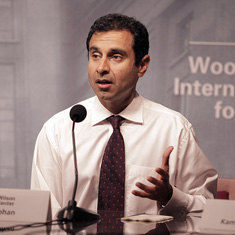-
From Octopus Conservation to Disaster Relief: Vik Mohan on PHE in Madagascar
September 27, 2013 By Laura Henson
When Tropical Cyclone Haruna struck in February 2013, leaving thousands without shelter and tens of thousands without water, it was a test for Blue Ventures’ integrated approach to development in southwest Madagascar. According to Dr. Vik Mohan, they passed.
“By the time the first aid organization arrived just to collect information, we had distributed to 17 villages already,” Mohan says in this week’s podcast. “We were the mouthpiece of the community, and because of our infrastructure on the ground, because of our good relationships with the community, we were able to procure and disseminate supplies that the community needed.”
When Tropical Cyclone Haruna struck in February 2013, leaving thousands without shelter and tens of thousands without water, it was a test for Blue Ventures’ integrated approach to development in southwest Madagascar. According to Dr. Vik Mohan, they passed.
“By the time the first aid organization arrived just to collect information, we had distributed to 17 villages already,” Mohan says in this week’s podcast. “We were the mouthpiece of the community, and because of our infrastructure on the ground, because of our good relationships with the community, we were able to procure and disseminate supplies that the community needed.”
Mohan, medical director of the London-based NGO Blue Ventures, spoke at the Wilson Center this summer during a discussion on integrated population, health, and environment (PHE) programs in coastal Madagascar and The Gambia.
Over the past decade, Blue Ventures has worked on marine conservation and ecotourism in the remote Velondriake region of Madagascar. “Blue Ventures, thanks to this initiative, manages the largest network of locally managed marine areas in the Indian Ocean, all designed to enable communities to live and manage their marine resources in a sustainable way,” Mohan says.
Though they began with a focus on octopus fisheries, their programming soon expanded. “Through our work with those communities, we unearthed a huge unmet need for health care, and health education, and family planning in particular,” he explains. According to Mohan, some girls in the region give birth as young as 11, and he noted that he met a woman in one village with 26 children. High total fertility rate meant the population was doubling every 10 years, and maternal and child health indicators were poor.
In response to this demand, Blue Ventures started operating clinics that, among other basic health interventions, offer voluntary access to and information about family planning. Now, “women who live in our 40 villages are no more than five kilometers away from a service point for family planning,” Mohan says. “The proportion of women using contraception has gone up five-fold in the six years since we’ve been operating this program, and mirroring that the birth rate has fallen by 40 percent.”
Offering both health and environment services, Blue Ventures’ holistic approach and community outreach puts them in a position to help when the communities need it most. “Working in an integrated way creates so many synergies that we’re now reaping the rewards of,” Mohan explains, “[because the communities] value our health education work, we get buy-in for our conservation work because they trust us as an organization.”
When Haruna, the biggest cyclone to hit the area in more than 35 years, made landfall, Blue Ventures’ local distributors were already in the area and immediately able to gather information about damage and needs. They then reached out to their national and international network and – as the only functioning aid organization in the area – were able to distribute valuable supplies in a timely manner.
So, “how well can a conservation organization do at providing health care? Can we have an impact? We think so,” Mohan says.
“Not only does working holistically, working in an integrated way, offer huge amounts of benefits in terms of enabling us to achieve our conservation and health goals more effectively,” he concludes, “we’re building capacity and ability to adapt to situations as communities experience them.”
Download Mohan’s slides to follow along.
Friday podcasts are also available for download from iTunes.
 A Publication of the Stimson Center.
A Publication of the Stimson Center.



